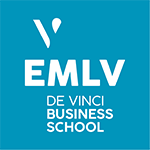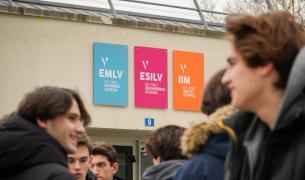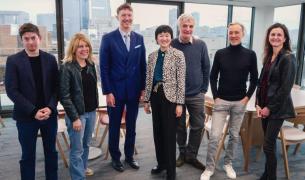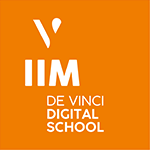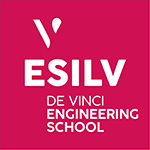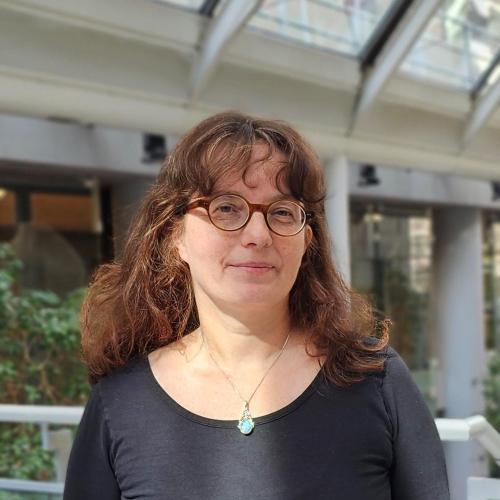
Flore Vallet joined ESILV Engineering School in 2023 as a teacher-researcher at the Engineering sciences department and De Vinci Research Center. Between 2026 and 2023, she was a researcher at the Institut de Recherche Technologique SystemX, and associate researcher at the Laboratoire Genie Industriel at CentraleSupélec. In 2022-23, she was the chair holder of the Anthropolis chair (http://chaire-anthropolis.fr/) dedicated to human centered urban mobility. Previously, she was lecturer (Professeur Agrégé) of mechanical design at the Université de Technologie de Compiègne - UTC. She obtained her PhD in Eco-Design and Mechanical Engineering from UTC in 2012. She is also member of the Design Society and of the French network EcoSD (Eco-design of Sustainable Systems). Her research interests currently include eco-design, eco-innovation, engineering design, human centered design, sustainable urban mobility, smart urban systems.
Julien Baltazar; Ghada Bouillass; Flore Vallet; Jakob Puchinger; Nicolas Perry
Integrating environmental issues into the design of mobility plans: insights from French practices Article de journal
Dans: Transport Policy, vol. 155, p. 1-14, 2024.
@article{baltazar_3124,
title = {Integrating environmental issues into the design of mobility plans: insights from French practices},
author = {Julien Baltazar and Ghada Bouillass and Flore Vallet and Jakob Puchinger and Nicolas Perry},
url = {https://www.sciencedirect.com/science/article/pii/S0967070X24001823?via%3Dihub},
year = {2024},
date = {2024-09-01},
journal = {Transport Policy},
volume = {155},
pages = {1-14},
abstract = {Local authorities have a strategic role in mitigating the environmental impacts of the transport sector. However, they struggle to integrate environmental issues into their decision-making processes, especially planning. In the European context of the Sustainable Urban Mobility Plan approach and Strategic Environmental Assessments (SEAs), this paper scrutinises three French localities to determine the current best practices and limitations for designing mobility plans and integrating environmental issues. Several limitations are identified: (1) limited expertise in defining and characterising actions and objectives, which complexifies plans' design, understanding, and monitoring; (2) a lack of a framework to conduct long-term quantitative environmental assessments and to use the results to influence decision effectively; and (3) monitoring processes are barely described in the documents, and the planning horizon where objectives are defined is not in sync with the indicators' mandatory evaluation period. This French case study thus reveals that European planning practices must be further analysed and improved to deal with the rising environmental concerns, e.g. through an operational framework to design mobility plans with effective integration of environmental issues.},
keywords = {},
pubstate = {published},
tppubtype = {article}
}
Tjark Gall; Sebastian Hörl; Flore Vallet; Bernard Yannou
Integrating future trends and uncertainties in urban mobility design via data-driven personas and scenarios Article de journal
Dans: European Transport Research Review, vol. 15, no. 45, 2023.
@article{gall_2771,
title = {Integrating future trends and uncertainties in urban mobility design via data-driven personas and scenarios},
author = {Tjark Gall and Sebastian Hörl and Flore Vallet and Bernard Yannou},
url = {10.1186/s12544-023-00622-0},
year = {2023},
date = {2023-11-01},
journal = {European Transport Research Review},
volume = {15},
number = {45},
abstract = {Urban mobility contributes significantly to greenhouse gas emissions and comes with negative social impacts for various groups, such as limited accessibility to opportunity or basic services. Transitions towards sustainable and people-centred urban mobility systems are paramount. Yet, this is accompanied by various challenges. Complex urban systems are accompanied by high uncertainties (e.g., technological progress, demographics, climate change) which are currently not well integrated. Possible solutions originate from design, policymaking, and innovation, with a widespread disconnection due to non-compatible methods. This paper presents a method to improve the ability to design future urban mobility systems by integrating different approaches for modelling what the future could be and who could be the users. The research question is how diverse future user needs can be integrated in design processes for urban mobility systems. The proposed scenario-based design and personas allows to create data-driven proto-personas?a set of archetypical users with assigned characteristics and behaviours?test their validity, derive distributions across geographical areas, and transform them for different 2030 scenarios. This serves as input to create full personas and synthetic populations as intermediary design objects for the collaboration of designers and simulation experts. The methodology is exemplarily applied in the context of Paris. It contributes to urban mobility solution design that is more aware of future uncertainty and diverse needs of users, therefore, better capable to respond to today's challenges. The approach is replicable with open data and accessible source code: https://github.com/TjarkGall/proto-persona-clustering.},
keywords = {},
pubstate = {online},
tppubtype = {article}
}
Yiming Ma; Flore Vallet; Bernard Yannou; François Cluzel
Tools to help teachers and designers complete individual tasks when co-designing industrial engineering games - Application to the design of an innovation management game Article de journal
Dans: European Journal of Engineering Education, vol. 48, no. 6, p. 1229-1248, 2023.
@article{ma_2767,
title = {Tools to help teachers and designers complete individual tasks when co-designing industrial engineering games - Application to the design of an innovation management game},
author = {Yiming Ma and Flore Vallet and Bernard Yannou and François Cluzel},
url = {10.1080/03043797.2023.2212248},
year = {2023},
date = {2023-10-01},
journal = {European Journal of Engineering Education},
volume = {48},
number = {6},
pages = {1229-1248},
abstract = {Serious games (SGs) offer an engaging format for teaching industrial engineering (IE) methodologies. IE methodologies involve people following a process in a set of conditions to design, improve and install systems, which are easily scripted into gameplay. The scholarship has proposed co-design approaches for teachers and SG designers. However, teachers are not always ready to engage, and designers can readily create SG elements rapidly alone. We propose a co-design framework to distinguish their roles and four tools for them to better embed relevant expertise in the SG design process. A first tool is a domain decomposition model, which helps teachers create the knowledge repository for an IE methodology. Then, a specification vector is provided to define clear learning objectives. The third tool is a mapping table that inspires designers building gaming elements based on the learning objectives. The final tool is a verification table that helps check whether the learning experience offered by a SG is aligned with its learning objectives. A game on innovation management was designed that adopts the co-design framework. It was tested in three sessions with 23 players, resulting in a playful learning experience .},
keywords = {},
pubstate = {published},
tppubtype = {article}
}
Tjark Gall; Flore Vallet; Laura Mariana Reyes Madrigal; Sebastian Hörl; Adam Abdin; Tarek Chouaki; Jakob Puchinger
Sustainable Urban Mobility Futures Ouvrage
Cham, Palgrave Macmillan, 2023, ISBN: 978-3-031-45794-4.
@book{gall_2779,
title = {Sustainable Urban Mobility Futures},
author = {Tjark Gall and Flore Vallet and Laura Mariana Reyes Madrigal and Sebastian Hörl and Adam Abdin and Tarek Chouaki and Jakob Puchinger},
url = {10.1007/978-3-031-45795-1},
issn = {978-3-031-45794-4},
year = {2023},
date = {2023-01-01},
pages = {187},
publisher = {Palgrave Macmillan},
edition = {Cham},
abstract = {This book provides a unique perspective on urban mobility focusing on past challenges and future trends. The book enables discussions of pathways towards sustainable and people-centred urban mobility building on existing concepts and introducing novel methods and consideration of future research. In particular, the book provides an overview of trends, design methods, and projects combining foresight and agent-based modelling to better integrate active mobility in Mobility-as-a-Service, assess impacts of automated vehicles in Paris, and compare multiple solutions in Cairo. The book provides a range of multidisciplinary concepts and methods that will be invaluable to both researchers in the field and students taking relevant courses.},
keywords = {},
pubstate = {published},
tppubtype = {book}
}
Julien Baltazar; Flore Vallet; Nicolas Perry; Jakob Puchinger
A quantitative strategic environmental assessment model to support the mobility planning process of local authorities Proceedings Article
Dans: 32nd CIRP Conference on Life Cycle Engineering (LCE 2025), Manchester, UK, 2024.
@inproceedings{baltazar_3257,
title = {A quantitative strategic environmental assessment model to support the mobility planning process of local authorities},
author = {Julien Baltazar and Flore Vallet and Nicolas Perry and Jakob Puchinger},
year = {2024},
date = {2024-12-01},
booktitle = {32nd CIRP Conference on Life Cycle Engineering (LCE 2025)},
address = {Manchester, UK},
abstract = {Local authorities are tasked to manage mobility in their area of influence. They usually rely on mobility planning to define their long-term strategy to move towards more sustainable mobility. However, the integration of environmental issues into planning remains poorly addressed by scholars and a hindrance for local authorities. One reason highlighted by the literature is the lack of quantitative ex-ante evaluations of the plans. The proposition of the paper is a Quantitative Strategic Environmental Assessment model (QSEA) that helps define the local authorities' strategy and validate the plan objectives.
The QSEA model characterises residents' mobility in all municipalities It assesses the cumulative distance travelled by cars and twenty environmental indicators relative to pollutant emissions and energy consumption, including indirect life cycle impacts. Moreover, the QSEA model: is based on accessible public data; reflects the density of the area; includes a description of the car fleet. The application to one representative French case (Metz Metropolis) highlights the sensitivity of distance travelled to periods of the week and density; the importance of indirect impacts due to energy supply and vehicles. This work is replicable to other metropolises while setting bases for longer term evaluations.},
keywords = {},
pubstate = {accepted},
tppubtype = {inproceedings}
}
Flore Vallet; Tjark Gall
Using the low-tech concept to create scenarios: an analysis of its potential to design for sustainable urban future Proceedings Article
Dans: Press, Cambridge University (Ed.): Proceedings of the Design Society, Volume 4: DESIGN 2024, p. 1487 - 1496, Cambridge, UK, 2024.
@inproceedings{vallet_3125,
title = {Using the low-tech concept to create scenarios: an analysis of its potential to design for sustainable urban future},
author = {Flore Vallet and Tjark Gall},
editor = {Cambridge University Press},
url = {https://www.cambridge.org/core/journals/proceedings-of-the-design-society/article/using-the-lowtech-concept-to-create-scenarios-an-analysis-of-its-potential-to-design-for-sustainable-urban-future/3046757270885F3D838ABC8FB9BB3500},
year = {2024},
date = {2024-05-01},
booktitle = {Proceedings of the Design Society, Volume 4: DESIGN 2024},
volume = {4},
pages = {1487 - 1496},
address = {Cambridge, UK},
abstract = {Designers must be equipped with methods to contribute to sustainability transitions. Scenario planning arose as approach to integrate future uncertainties while the low-tech concept promotes technological discernment. This paper looks at how low-tech fuelled scenario planning. Analysing institutional and archetypical scenarios shows a partial integration through high and low-tech extremes. However, more nuanced considerations are lacking. This paper shows that low-tech can bring an interesting dimension to future scenarios and thus contributes to method development for sustainable design.},
keywords = {},
pubstate = {published},
tppubtype = {inproceedings}
}
Flore Vallet; Benjamin Tyl; François Cluzel; Cédric Masclet
A transition approach for reuse and repair of manufactured products Proceedings Article
Dans: Press, Cambridge University (Ed.): Proceedings of the Design Society, Volume 4: DESIGN 2024, p. 1477 - 1486, Cambridge, UK, 2024.
@inproceedings{vallet_3126,
title = {A transition approach for reuse and repair of manufactured products},
author = {Flore Vallet and Benjamin Tyl and François Cluzel and Cédric Masclet},
editor = {Cambridge University Press},
url = {https://www.cambridge.org/core/journals/proceedings-of-the-design-society/article/transition-approach-for-reuse-and-repair-of-manufactured-products/B0C5B4E96912BAAC99F3306DDEE0438B},
year = {2024},
date = {2024-05-01},
booktitle = {Proceedings of the Design Society, Volume 4: DESIGN 2024},
volume = {4},
pages = {1477 - 1486},
address = {Cambridge, UK},
abstract = {The landscape of reuse and repair (R&R) activities for manufactured products is vibrant: new European laws, research projects, local initiatives. Our aim is to capture the current and future challenges of the field through an industrial workshop held at the ICED23 conference. A collective reflection was conducted with three French stakeholders: a Product Responsibility Organization, a social and solidarity organization, and a private company producing water-driven dosing pumps. The study results in a multi-level perspective on the R&R value chain and four R&R future scenarios.},
keywords = {},
pubstate = {published},
tppubtype = {inproceedings}
}
No posts by this author.
N'hésitez pas à contacter le service des admissions pour tout renseignement complémentaire :
